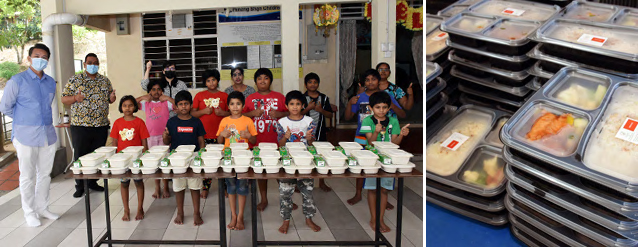Movement and social restrictions along with business challenges have relegated CSR elements within most business events to the bottom of the to-do list. However, for those who are determined to do good, many options exist.
Once upon a time, before the world knew Covid-19 and global travel restrictions, and when people could easily cross borders to mingle, exchange knowledge and trade, most business events would include some form of meaningful corporate social activity to allow delegates an opportunity to leave the host destination in a better shape than they had found it.
Rebuilding schools, visiting wildlife sanctuaries to appreciate animal conservation efforts, interacting with indigenous people, and packing and delivering meals or daily essentials to needy communities were all popular corporate social responsibility (CSR) elements within business programmes.

When Covid-19 swept across the globe, it disrupted travel and changed the way people socialise. Maintaining internal meetings was challenging, more so coming together with external communities.
Ailynn Seah, vice president of sales, MIC and association with Marina Bay Sands (MBS) Singapore, found that as Singapore’s business events ground to a halt in 2020, CSR activities “understandably took a backseat for event organisers”.
“Even with the gradual resumption of the business events industry, restrictions such as safe distancing, and cancellation of mass and group events may force event organisers to think harder before incorporating any CSR activities in immediate programmes. They may even face greater challenges trying to evolve their CSR plans, incorporating virtual or hybrid elements, to suit the current environment,” said Seah.
On the other hand, Michelle Sargent, director, Australia/New Zealand, CWT Meetings & Events, told TTGmice that companies are “still very interested in CSR activities”, with half of all meeting and event RFPs in Australia over the past six months requiring an opportunity to give back to hard-hit communities.
“One change we have observed is a preference to give back to local communities where the client’s business is based, compared to pre-pandemic times where we also saw a lot of interest in supporting initiatives in other regions. This may, in part, be down to the inability to travel,” Sargent said.
While acknowledging that restrictions around in-person events have presented obstacles to conducting hands-on CSR programmes as part of business events, Sargent believes that there is nothing some creativity cannot fix.
Just a little differently
For event organisers and owners who were determined to retain CSR goals within their altered activities, a dose of creativity was needed.
Fu Kei Cheong, co-founder of Malaysia headquartered PCO Anderes Fourdy, told TTGmice that the act of donating attendance fees collected from event delegates can replace traditional CSR initiatives.
“We had an example where pre-conference workshop fees were collected and donated to a patient healthcare organisation,” shared Fu.
The Penang Convention & Exhibition Bureau (PCEB) attempted this approach, pledging registration fees collected from its BE@Penang virtual conference in December 2020 to fund a food donation drive that benefitted orphanages in the Malaysian state.
PCEB worked with 10 hotel partners to provide 370 packaged food for the children and caretakers in 10 orphanages and social organisations. Hotel partners also contributed care kits that included face masks and hand sanitisers, while other partners matched PCEB’s donation with additional food items.
Anderes Fourdy is presently working on a congress this year that is committed to raising funds to afford a six-month-long data subscription for 100 students.
“Priority is given to students who are taking the public school exams in 2021 and cannot afford data subscription. We are also trying to get Internet Service Providers onboard so that the money raised through the congress would go even farther,” said Fu.
Virtual goodness
CSR activities could take the virtual route, just as many business events have done amid global travel restrictions, opined Sargent, who suggested having delegates working individually – or together in the same region – to pack goods for specific charities, or having delegates participate in online cooking classes or music programmes with communities in need.
Another idea is to send virtual delegates gift boxes packed with goodies from in and around the region. “In doing so they are helping to support local businesses and communities,” she said.
When asked what event organisers and owners should consider when incorporating CSR objectives into digital or hybrid event formats, Seah said: “Just like it takes time for event organisers to adopt hybrid event formats, similarly, the implementation of new formats of CSR activities will have a longer incubation period.
“Event organisers will first have to weigh the feasibility of implementation, the potential participation rate, and the company’s CSR mandate before proceeding.”
She described the business events industry’s move to digital and hybrid formats as a “steep learning curve”, but MBS’ team of certified Digital Event Strategists has been able to help clients achieve a smooth transition.
“Leveraging on our past extensive experiences in working with clients to incorporate CSR-related activities in their event programmes, our team is ready to brainstorm with our clients on new and innovative CSR ideas and formats,” she added.
“It is always heartening to see event organisers get creative and take an interest in doing good for the community even during these uncertain times,” Seah added.
Sharing an example of a CSR programme that was conducted as part of a hybrid business event, Seah said the WiT Experience Week 2020 hosted an online art auction that raised about S$40,000 (US$29,685). The money was used to improve the lives of women and children in Asia.
For the online art auction, attendees were invited to co-create a piece of art by visualising the future of travel and provide words that best describe “Travel 2025”. On the final day of the event, the physical art piece was auctioned off for charity.

Green step forward
Having a standalone CSR activity may not always be necessary for an event to leave behind positive impact.
The act of replacing an overseas meeting with a virtual gathering can be seen as a way to cut carbon footprint – a good way to achieve CSR objectives, pointed out Sargent.
Working with eco-conscious vendors would also score some CSR points.
Marriott International’s in-built sustainability initiatives allow event clients to achieve green goals without additional effort on their part. All properties in the chain no longer provide plastic straws and instead offer environmentally friendly alternatives. Certain properties run their own eco-friendly initiatives as well as utilise energy efficient fixtures.
For example, trestle tables at Sheraton Grand Sydney Hyde Park, Australia are table-cloth-free to reduce laundry needs and the property has shifted to using recyclable glass bottles. At Element by Westin Kuala Lumpur, Malaysia, water stations have been introduced as an alternative to plastic water bottles. Over at JW Marriott Marquis Hotel Shanghai Pudong in China, energy efficient LED lights are used.
Event organisers and owners can further reduce their carbon footprint by arranging green transportation for delegates. More than 100 electric vehicle charging stations are offered at Marriott properties across Asia-Pacific.
Ramesh Daryanani, vice president, global sales, Asia Pacific, noted that event clients have not lost their focus on CSR despite the pandemic, and they have continued to support Marriott International’s sustainability and social impact work.
“From the planning stage to the event roll-out, we support event planners with various resources and initiatives they can tap on, to create a positive impact. By choosing to host their events and meetings at our properties, they can be assured that they are already taking the first step in making a difference in the communities where our hotels operate,” he explained.
Property-level environmental data is made available so that event organisers and owners can assess the impact of their stay and meeting with a Marriott property.
Every bit counts
Industry specialists who have made it part of their job to advise and assist clients on CSR elements within their business events, are taking it upon themselves to support needy causes as event CSR priorities take a backseat.
Instead of replacing the company’s old onsite registration laptops, Anderes Fourdy chose to donate them to children in need of devices to attend virtual classes during Malaysia’s lockdown.
“Some needy students were trying to purchase our laptops to attend virtual classes. Their stories were very depressing. Some had to share a mobile phone with four other siblings to attend classes. So, instead of selling our laptops, we chose to donate them and have given away more than 30 laptops to-date,” said Fu.
MBS, which typically connects event clients with worthy organisations and needy communities seeking support, utilised property-wide resources to maintain assistance to affected communities during the pandemic.
“Ahead of a government-mandated industry closure (part of the country’s Circuit Breaker nation-wide lockdown) last April, we had 48 hours to amass and donate 15,000kg of unused produce from our F&B outlets to vulnerable communities under The Food Bank Singapore,” shared Seah.
Furthermore, team members volunteered to distribute meals to Muslim families in need, as well as to healthcare workers and their families during the Ramadan fasting month in 2020. The move supplemented the manpower crunch experienced nationwide.
Team members also came together to pack 10,000 care kits with essential items such as masks and soaps, and donated these supplies to low-income families, healthcare and construction worker communities.
As well, a Red Cross blood donation drive was organised last September to increase the low national blood supply, “especially vital during pandemics”, said Seah.
Even as Singapore gains considerable control over the pandemic and the city-state relaxes restrictions on public activities, MBS is determined to continue with its community efforts.
It has explored new ways of community engagements, including co-organising the virtual Community Chest Heartstrings Walk 2021 with Community Chest. The event aims to rally individuals, public and private sectors to take a step forward together to support families in need, children with special needs and youth-at-risk, adults with disabilities, vulnerable seniors and persons with mental health conditions. Co-organised for the 10th year, this year’s Heartstrings Walk allows participants to choose from two virtual walk formats of 5km each – Heartstrings Walk Marina Bay and Heartstrings Walk Anywhere.
Keeping up the good work
 Support education
Support education
At a time of business and career upheaval, upskilling becomes ever more important for people to stay relevant and employable. Event organisers and owners can help make education more accessible for either the new bloods or professional peers who were unfortunately displaced.
One way to do this is to establish an education fund, with money coming from event registration fees, sponsorship or a fund-raising exercise conducted among attendees.Another option is to offer attendees in need free access to online conference content and mentorship sessions.
 Support ecotourism projects
Support ecotourism projects
The global travel freeze has impacted environmental and wildlife conservation projects that are dependent on tourism to further public education, as well as for revenue to fund activities. Even as in-person visits to these project sites are impossible, event organisers and owners can incorporate conservation project messaging within their programme and establish a fund-raising effort in the lead up to, during and after the event to aid affected projects.
 Support small businesses
Support small businesses
The pandemic and resulting economic impact have devastated many small local businesses. Event organisers and owners can choose to prioritise small local suppliers in their procurement of live entertainment, fresh flowers for table arrangements, welcome bags for delegates, appreciation gifts for speakers, and others. For virtual events, small local businesses could be called on to supply snack packs or gift packs to be delivered to remote attendees.





















